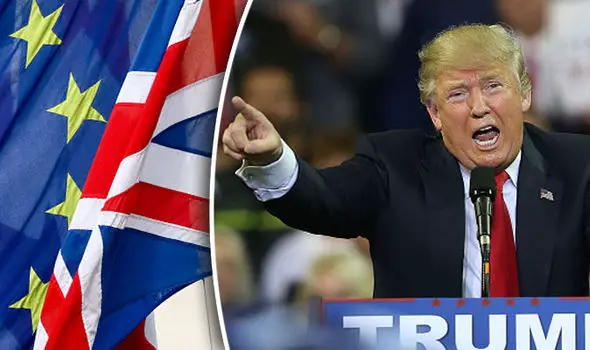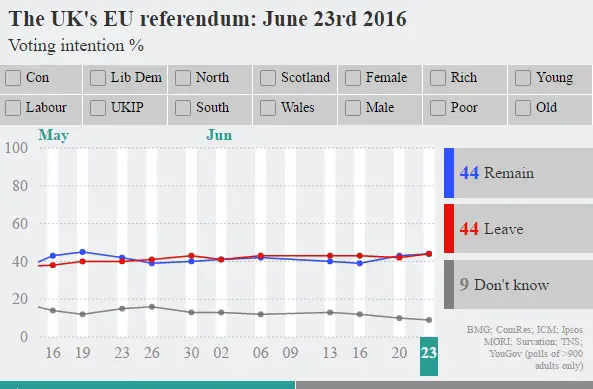Our election polls are getting close, with the momentum behind Donald Trump. At this point, it’s unlikely that a “November surprise” would be absorbed quickly enough to make a difference. When the polls were not this close, Trump claimed that his victory would be due to the “Brexit effect,” referring to the vote in Britain to “exit” from the European Union. Most people, around the world, expected the referendum to go down to defeat, just as Scotland’s referendum to leave the United Kingdom had lost.
The prevailing rational has been that British voters were embarrassed to say they supported “Brexit,” since it was not considered “civilized” to be in favor of leaving Europe. But is that rational correct? Maybe, maybe not.
The truth is the Brexit polls weren’t awful for Remain in the European Union movement. In fact, The Economist’s tracker concluded that Remain and Leave the EU were tied. Other aggregations showed larger leads for Remain but clustered around a one- or two-point Remain win. . .
What happened in England was instead a failure of prognostication. Betting markets showed Remain as a heavy favorite. Most columnists thought Leave would lose. Even analysts looked at the data and came up with rationales as to why Remain would emerge victorious.
The problem, in retrospect, was that the socioeconomic class to which columnists, analysts, and speculators in political markets belonged had a heavy pro-Remain tilt to it. This infiltrated their analysis, as the supposedly objective measurements that they chose turned out to be massive exercises in confirmation bias.
In other words, it’s not true that the UK polls were wrong. It was just the “talking heads” whose heads were up their. . .er, um, did not see the light of day. That’s because “common sense” was that Britain would cause too much chaos by reversing a half-century of improved involvement with their neighbors. And that “common sense” was among the pundit class.
It was not the polls that were wrong. It was the poll readers.
THE final update of our poll tracker is similar to the first. As the public head off to vote, opinion is split evenly and a tenth still say they have not decided. While Wales wavers, most other components of our tracker have stayed persistently stubborn in their relative positions. For all the campaigning neither the Remain nor the Leave camps have convinced voters of their cause. A high overall turnout will likely benefit Remain, as young people and richer old folk are keener on the union, but a big turnout is far from guaranteed.
The polls showed a tie. The Brexit vote really shows that “Remain” supporters were overconfident, and just stayed home.
The Scottish turnout was particularly disappointing. Three in five Scots backed Remain and they were expected to have the highest figure after “referendum fever” saw 85 per cent of Scots vote in the 2014 independence vote.
But in the end they had a lower turnout than every region except Northern Ireland.
Not to mention “those dang kids.”
Before the referendum, Remain campaigners feared that lazy youngsters would cost Britain its future in the EU, leaving others to vote for Brexit on their behalf.
Now that Britain has voted to leave the EU, with a national turnout of 72.2 per cent, this fear seems to be realised. Those areas with the highest share of older voters also enjoyed the highest turnout, helping to shift the referendum.
Then, there was the undecided vote. As you can see from this chart, polls showed the public sentiment tied, 44% for, 44% against, 9% “don’t know,” and presumably, 3% who don’t know that they don’t know. Thus, the issue was really decided by the “undecideds.”
However, the real difference was in the betting markets. According to John Stossel, Fox News contributor, founded a website to report on movement of the betting markets, ElectionBettingOdds.com. He feels that they are a better forecaster of events, because perople have “put their money where their mouth is.”
Why trust these odds?
Studies find that political prediction (betting) markets tend to be better at predicting elections than polls. Some reasons:
– Bettors take into account important factors besides polls.
– Unlike pundits, bettors put their money where their mouths are.
– People involved in the event might trade before news breaks publicly
– The “wisdom of crowds.”
Again, maybe, maybe not. Here’s where the real disparity occurred between forecasts and the final vote.
. . . one group of people have been steadfastly consistent over the outcome of the EU referendum: the bookies. . . over the last week, they have shortened their odds dramatically, going from 4-6 (implying a 60 per cent chance of winning), to as much 2/9 with an 82 per cent chance of victory – while in the past 10 days the polls have swayed between a 10-point Brexit lead and a narrow two-point margin in favour of Remain.
So while some polls actually showed a lead by the “Leave” side, the bookies were saying Brexit would fail, with an 82% chance of certainty. The article goes on to say that the gamblers did get the Scottish referendum right, but that they were far off, predicting a large win for the Tories in the most recent election—which did not materialize.
Once again, THE POLLS WERE RIGHT. The Brexit vote was mostly due to low turnout by the “Remain” camp, caused by overconfidence from listening to the pundits. But why were the gamblers so wrong?
Matthew Shaddick, head of political betting at Ladbrokes. . . wrote in his blog post: “The truth is that bookies do not offer markets on political events to help people forecast the results. We do it to turn a profit (or at least not lose too much).”
. . . Ahead of voters going to the polls, all the bookies warned that favourites sometimes lose. (They might be more likely to win, but their victory could not be guaranteed.) And the bookies all agreed that while three-quarters of the £40 million eventually gambled on the referendum was placed on Remain, when it came to counting individual flutters, bets on Leave far outnumbered punts on staying in the EU. . .
But as he had earlier explained to The Independent, one problem with betting was the vast amount of wishful thinking that went on. And in this contest, he said: “I think there’s something to be considered in the fact that the most affluent sections of society were generally behind Remain.
“Maybe there just aren’t enough dispassionate investors out there to correct that possible bias, even in a multi-million pound market like the EU Referendum.”
So while John Stossel claims that bettors will be more reliable than pundits, because they have real money on the line, he overlooks people’s desire to change events by wishful (positive) thinking. To some degree, bettors even think if they run up the price of a market, they can have an effect on the outcome. Magical Thinking: like when people pray to God for their team to win, thinking they can tell the universe what to do.
OK, so where do we stand in this 2016 United States presidential election? Well, Stossel’s site says bettors give Hillary Clinton a 70.7% chance of winning.
But as he had earlier explained to The Independent, one problem with betting was the vast amount of wishful thinking that went on. And in this contest, he said: “I think there’s something to be considered in the fact that the most affluent sections of society were generally behind Remain.
“Maybe there just aren’t enough dispassionate investors out there to correct that possible bias, even in a multi-million pound market like the EU Referendum.”
Meanwhile, Nate Silver’s FiveThirtyEight.com gives her a 64.9% chance of winning, according to the polls, and his “polls-plus” analysis, which includes historical, economic, and other factors.
What about the actual polls? Well, RealClearPolitics does an average of recent reliable polls, and they say Hillary is now up by only 1.7%, which is within the margin of error. More importantly, put in terms of probability, she’s given only a 47% chance of winning, to Trump’s 45.3% chance. And just like Brexit, it will be up to the “undecideds” to decide this election.
Then. . .what about the “Brexit effect”? Well, as it turns out, Hillary has her own “Brexit effect.”
One would expect voters from the heavily Democratic Brooklyn neighborhood of Cobble Hill to pick presidential candidate Hillary Clinton in the Nov. 8 general election. Just don’t expect them to advertise it.
Like lawns and windowsills in liberal pockets across the country, much of the neighborhood is bereft of pro-Clinton signage in the final weeks before the election. It’s a stark contrast to the 2012 and 2008 campaigns, when President Barack Obama whipped up a frenzy of support from Democrats and his signature “Hope” and “Forward” signs were ubiquitous.
The scarcity of lawn and window signs is an indication of the Democratic nominee’s struggle to generate enthusiasm among left-leaning voters, a challenge that’s borne out in polling data, and could potentially haunt her if voters fail to turn out on election day.
I am not surprised. I’ve seen more than a half-century of presidential elections, and this is the only one in which people don’t seem to want to show for whom they are voting. I don’t remember seeing a single yard sign in the city where I live, nor in my travels. Everybody seems to hate both candidates. And that has made voting in this election a real “Sophie’s Choice” (from the movie of the same name).
And, finally, the “Brexit Effect” has also been described as the “Shy Voter.” The idea is that many voters are embarrassed to say they’re voting for Trump. Is that true? Not according to a new study.
The “shy Trump” theory centers around a basic premise: Given Trump’s controversial candidacy — which has featured attacks on electoral norms he derides as “political correctness,” provocative policy proposals like a ban on Muslims entering the U.S. and vulgar comments about women — some voters may perceive it is socially undesirable to admit support for the Republican nominee. . .
“Donald Trump performs consistently better in online polling where a human being is not talking to another human being about what he or she may do in the elections,” Conway said. “It’s become socially desirable, especially if you’re a college-educated person in the U.S., to say that you’re against Donald Trump.”
. . .[However,] According to a POLITICO/Morning Consult study conducted by Morning Consult this past weekend and released Thursday, a hidden army of Trump voters that’s undetected by the polls is unlikely to materialize on Election Day.
The study — which was composed of interviews with likely voters conducted over the phone with a live interviewer, and other interviews conducted online without a personal interaction — showed only a slight, not-statistically-significant difference in their effect on voters’ preferences for president. . .
We don’t know who’s going to win. But if Trump wins, it’ll be because the polls were right (within the margin of error), it won’t be because of a “Brexit effect. And if he loses, it won’t be because of some hokey “rigging.” In the United States of America, elections are run by honest people in each of the 50 United States, and their integrity should not be impugned.
Donate Now to Support Election Central
- Help defend independent journalism
- Directly support this website and our efforts

